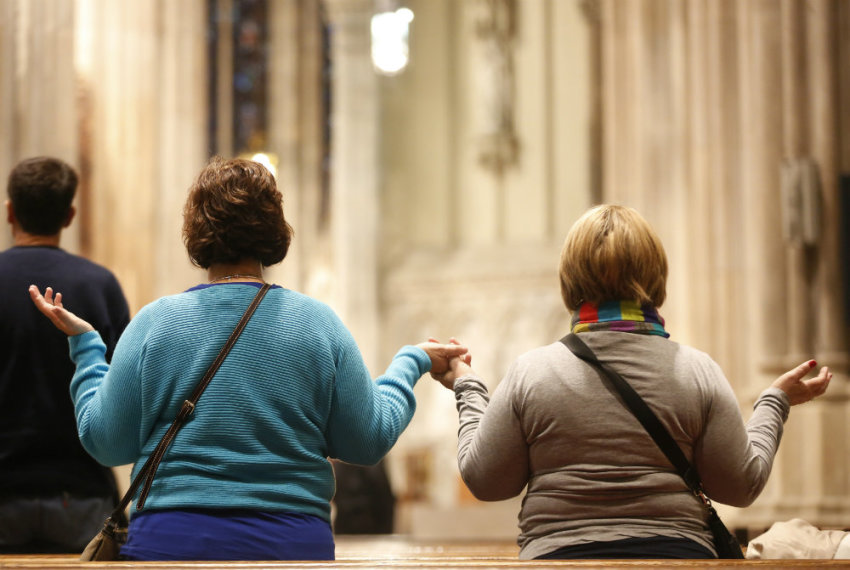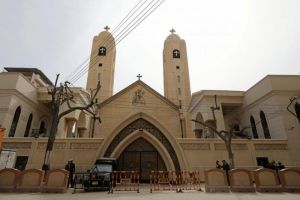Catholics who accept all of the church's teachings are most likely to vote for Trump: poll

Catholic support for President Donald Trump has increased but there’s a disconnect between Catholics who agree with all of the Church’s teachings and those who don’t.
The Eternal Word Television Network and RealClear Opinion Research released the survey of over 1,521 registered self-identified Catholic and former Catholic voters Monday.
The results show that even though Trump is still trailing Democratic candidates in head-to-head polling, one of the most prevalent predictors of whether or not a Catholic voter will vote for Trump is whether or not he or she accepts the entirety of Catholic church teachings.
About 18 percent of the respondents said that they “accept all the Church’s teachings,” which conflict with Democratic Party positions on issues like abortion and same-sex marriage.
Thirty-eight percent of respondents said that they “accept most of the Church’s teachings,” while 29 percent said they “do not accept some of the key teachings.” Thirteen percent said Catholicism has a “minor influence” on them, while 2 percent identified as former Catholics.
“[The 18 percent group] is the one that has opinions that are distinct from essentially the other 80 percent who indicate that their religion plays a less integral role in their lives,” John Della Volpe, the director of polling at RealClear Opinion Research, said on a conference call with reporters.
While the majority of Catholics surveyed (53 percent) said they disapprove of the job Trump is doing as president, 59 percent of Catholics who say they accept all the Church’s teachings indicate that they are “sure” they will vote to reelect Trump in 2020. As well, 8 percent of devout Catholics said there is a “very good chance” they will vote to reflect Trump.
“So that’s 67 percent [of devout Catholics who] say they are sure to reelect him or there is a very good chance they will,” Volpe said. “This is a core group of that 18 percent. In addition to that, they are more likely to follow the news and they are much more likely than the other Catholics to indicate that they never miss an election. Seventy-five percent indicate that they vote in almost every federal election.”
By comparison, 34 percent of the 1,521 total respondents said they are “sure” to vote for Trump in 2020 and 12 percent said there is a “good chance” they’ll vote for him in 2020. Thirty-six percent of all respondents said they will “never” vote for Trump, while 10 percent said it is unlikely they’ll vote to reelect the president.
About 8 percent of all respondents said that “it is possible” they will vote for Trump in 2020.
The poll is the second in a series of four polls on Catholic political and theological opinions during the 2020 election cycle to be conducted, the first of which was released in December. The respondents were surveyed online between Jan. 28 and Feb. 4 and the results have an error margin of 2.77 percent.
Trump’s job approval rating among Catholics of 47 percent is in line with the national average, Volpe explained. In the December polling, Trump’s job approval among Catholics was at 44 percent.
“Historically, if the Catholic vote is evenly divided, you're looking at a close election,” Real Clear Politics Washington Bureau Chief Carl Cannon said. “It happened last time. The job approval rating in social sciences is the gold standard because the question has been asked the same [way] starting with George Gallup in the 1930s. … It's not always been a predictor of reelection. But with this president, it kind of feels like it is.”
Volpe said that the 18 percent group of respondents who accept all the Church’s teachings is “unique” for different reasons.
One, he said, is they include more people of color (41 percent Hispanic), with nearly half of the demographic being white. He added that there are slightly more females (52 percent) in the group than males. Nearly one-third of the respondent group is below the age of 45.
Volpe said that 72 percent of those who say they accept the Catholic Church’s teachings attend mass at least once per week and 92 percent say they pray at least once per week.
Additionally, at least half of the Catholics who accept all the Church’s teachings are Republican and 38 percent are Democrats.
As for the less devout Catholics, about 30 percent consider themselves Republican.
Among Democratic Catholics, former Vice President Joe Biden, the only Catholic in the primary, seems to have a slight edge over his competitors.
Twenty-nine percent of respondents who said they are likely to cast a Democrat primary ballot said they are likely to vote for Biden and 24 percent said they are likely to vote for Vermont Sen. Bernie Sanders. Seventeen percent said they would likely vote for former New York City Mayor Mike Bloomberg and 10 percent indicated support for Massachusets Sen. Elizabeth Warren.
“I want to note that when we think about the upcoming primary on a national basis, we see the race at the top level unchanged since the last wave was polled,” Volpe said.
The poll also questioned respondents about their opinions on various political issues.
A major issue for Catholics over the years has been abortion, as Catholics have led the pro-life movement over the decades through events like the annual March for Life.
On abortion, 47 percent of all respondents said that they think abortion is “intrinsically evil,” while 71 percent who say they accept all the Church’s teachings said the same.
Twenty percent of all respondents surveyed said they think abortion should always be legal (20 percent). Thirty-one percent of respondents said they think abortion should be legal but want limits on late-term abortion. Thirty-three percent said they think abortion should be illegal except in cases of rape, incest or to save a mother’s life. Eleven percent said they think abortion should always be illegal.
Among the 18 percent of Catholics who say they accept all the Church’s teachings, 23 percent said they think abortion should always be illegal and 32 percent said that it should be illegal except in the cases for rape, incest or to save a mother’s life. Twenty-seven percent of devout Catholics think abortion should always be legal.
“What it tells me is that even the most devout Catholics, they take the separation of church and state pretty seriously,” Cannon said. “They don't always just go with what their faith says. That doesn't mean they do it in their own lives. But they think they grant some space to the political sphere to work out these issues.”
Catholics are divided when it comes to whether or not Christian business owners should have the right not to provide services for a same-sex wedding.
While 45 percent of all respondents said they think business owners should have that right, 40 percent said business owners should be required to provide services for same-sex weddings. Fourteen percent said they did not know.
About 55 percent of all respondents said they think that transgender individuals’ use of public restrooms should be consistent with biological sex. Meanwhile, 30 percent believe transgender individuals should be allowed to use bathrooms consistent with their gender identity.
Follow Samuel Smith on Twitter: @IamSamSmith
or Facebook: SamuelSmithCP



























